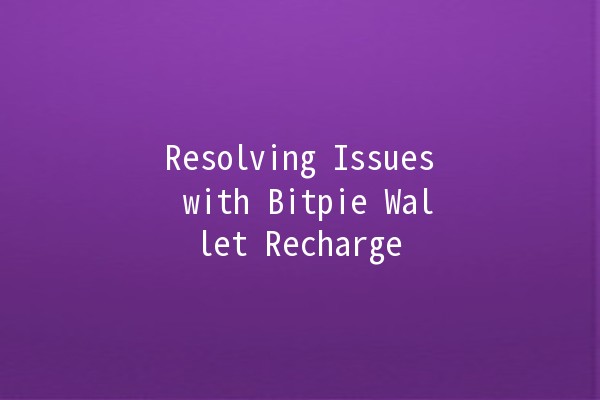
Cryptocurrency wallets have become essential tools in the digital financial landscape. Among the many options available, Bitpie Wallet has garnered attention for its versatility and userfriendly interface. However, even the most reliable platforms can encounter technical hiccups. One common issue that users face is the failure to recharge their wallets. In this article, we will explore practical methods to troubleshoot recharge failures on Bitpie Wallet and provide actionable tips to help users navigate these challenges effectively.
Understanding Recharge Failures
Recharge failures can occur due to various reasons, including network issues, incorrect wallet addresses, and insufficient funds. Understanding the potential causes is the first step toward resolution.
Common Causes of Recharge Failures

Tips to Resolve Recharge Issues
Here are some effective strategies to address problems with recharging your Bitpie Wallet:
Before initiating a recharge, ensure that the wallet address is correct. A small mistake in the address can result in lost funds. Here’s how you can verify:
Copy and Paste: Use copypaste functions to avoid manual entry errors.
DoubleCheck: Always doublecheck the address by comparing it with the original source.
Before trying to recharge, check the status of the cryptocurrency network. Websites like BlockExplorer allow you to view transaction confirmations and network congestion. If the network is down or congested, it’s best to wait before retrying the transaction.
Ensure you are using the latest version of the Bitpie Wallet app. Updates often contain bug fixes and improvements that can resolve recharge issues. Follow these steps:
Visit the App Store: Check for any pending updates in the iOS App Store or Google Play Store.
Install Updates: If there are updates available, install them and restart the app to see if the issue persists.
Ensure that you have enough balance to cover the recharge amount and transaction fees. This can prevent failed transactions due to insufficient funds.
Check Your Balance: Always keep an eye on your balance before initiating a transaction.
Use a Calculator: Some wallets have builtin calculators that can help determine the exact amount needed for a recharge, including fees.
If none of the above solutions resolve your issue, it may be best to contact Bitpie Wallet’s customer support. Provide them with specific details regarding your transaction attempt, including:
Transaction ID: Always keep a record of your transaction ID for reference.
Screenshots: Take screenshots of error messages or issues encountered.
Dealing with Network Congestion
Network congestion is a situation where the blockchain is overwhelmed with transactions. This can lead to delays in transaction confirmations and failures in recharge attempts. Here are some strategies to manage this:
Transactions can be faster during offpeak hours. If possible, try initiating transactions late at night or early in the morning when fewer people are likely to be online.
Some wallets allow you to set transaction fees manually. A higher fee can sometimes expedite the processing of your transaction during times of congestion. Before finalizing your transaction:
Review Fee Options: Look for options that let you customize fees based on urgency.
Be Aware: Higher fees may not guarantee a faster transaction, but they typically improve the chance.
If you’re frequently encountering congestion on a particular network, look into Layer 2 solutions or alternative networks that support your transactions. These solutions often offer faster transaction times at lower costs.
Improving Your Overall Experience with Bitpie Wallet
Having a smoother experience with your Bitpie Wallet goes beyond merely addressing recharge failures. Here are some productivity tips to enhance your cryptocurrency management:
TwoFactor Authentication provides an added layer of security. By enabling 2FA, you ensure that even if someone gets hold of your password, they will not be able to access your wallet.
Set It Up: In the security settings of your app, enable 2FA.
Backup Codes: Make sure to save backup codes in case you lose your authentication device.
Stay informed on security practices and ensure that your wallet is always secure. Use strong passwords and change them regularly.
Don’t keep all your digital assets in one wallet. Use multiple wallets and diversify your cryptocurrency holdings to mitigate risks.
Keep an eye on cryptocurrency market trends, as they can affect transaction times and fees. Websites like CoinMarketCap can provide useful insights.
For longterm hold, consider using hardware wallets for storage. This keeps your assets offline and less vulnerable to hacks.
Frequently Asked Questions
If you've sent funds to the wrong address, there is little that can be done. Once a transaction is confirmed on the blockchain, it's irreversible. Always doublecheck wallet addresses before sending any funds.
To check your transaction status, open your Bitpie Wallet app, navigate to the transaction history, and select the relevant transaction. You can also use blockchain explorers by inputting your transaction ID.
If your funds are stuck in pending status, it might be due to network congestion. Check the current status of the network and be prepared to wait for transactions to clear. You can also reach out to Bitpie's customer support for assistance.
Yes, each transaction involves network fees, which can vary based on network congestion and the type of cryptocurrency being used. Always check your balance to ensure you account for these fees when recharging.
To enable notifications, go to the settings of your Bitpie Wallet app and look for the notifications section. From there, you can customize how and when you receive updates about your transactions.
If your Bitpie Wallet app crashes, try the following steps: restart your device, clear the app's cache, and check for app updates. If problems persist, consider reinstalling the app or contacting customer support for additional help.
Recharge failures on Bitpie Wallet can be frustrating, but understanding the causes and implementing the suggested strategies can minimize these issues significantly. By staying informed, practicing good security habits, and utilizing the tips provided, you can ensure a smoother experience with your cryptocurrency wallet.

